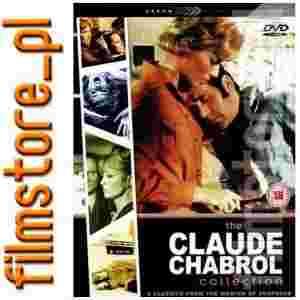Opis:
Claude Chabrol, the originator of the French "Nouvelle Vague" film movement, gets the box set treatment. Known in some circles as the "French Hitchcock" for his mastery of the suspense medium, and appreciation of the aforementioned director. Les Biches (1968): Stéphane Audran is Frédérique, a wealthy woman with lesbian leanings who, on a whim, picks up a young, attractive, impoverished Parisian girl. The relationship that develops is complicated with the arrival of Paul, who becomes a lover to both. However, Frédérique is determined to have him all to herself. La Femme Infidele (1969): Hélene's (Stéphane Audran) predatory needs are causing problems in her marriage. Believing that his wife may be cheating on him, Charles (Michael Bouquet) hires a private detective. When his worst fears are confirmed, Charles confronts her lover in this tale of betrayal and murder. Que La Bete Meure (aka: This Man Must Die) (1969): When his son is killed in a hit and run incident, Charles is determined to take revenge. A chance meeting introduces him to Paul, whom he suspects of the murder. He decides to infiltrate Paul's family by faking a love affair with his sister-in-law, only to find that the entire family despise him. It is through this hatred that Charles plots his revenge. A thrilling and twisted tale of vengeance. Le Boucher (1970): Stéphane Audran plays a lonely schoolteacher who becomes involved with an ex-army butcher. When local girls are found dead, suspicions build as to who may be the serial killer plaguing the small town. Drawing on Hitchcockian themes of exchanged guilt and shared secrets, Chabrol examines their extraordinary relationship in this chilling drama. Juste Avant La Nuit (aka: Just Before Nightfall) (1971): Charles, an advertising executive, is having an affair with Laura, the wife of his best friend. When one of their S&M games goes too far, Laura is accidentally strangled. Though the police are struggling to solve the murder, Charles finds it difficult to cope with the situation and to live a normal life with his two children and loving wife Helene. A masterful exploration into friendship and the darker sides of human nature. Les Noces Rouges (aka: Wedding In Blood) (1973): Lucienne and Pierre are having a dangerous affair: her husband, Paul, is mayor and Pierre is his vice-mayor. When Pierre's wife dies suddenly in an apparent suicide, many believe there may be more than meets the eye. In the meantime, Paul proposes a shady land deal to 'benefit the town', and wants Pierre's support. But then he discovers proof of his wife's affair. A moving tale of adultery and political skulduggery originally banned due to similarities with a genuine murder case that shocked France. Nada (1974): A small terrorist group, Nada, kidnaps the American ambassador from a Parisian Brothel, secreting him away in an isolated farmhouse while they wait for an answer to their demands. As the police close in on the kidnappers, it becomes clear that they are less concerned with rescuing the ambassador than they are with eliminating the terrorists and turning the situation to their political advantage. Madame Bovary (1991): Emma Bovary is beautiful and bored, trapped in her marriage to a local doctor and stifled by the banality of provincial life. Longing for passion and meaning in her life, she seeks escape in fantasies of high romance, in voracious spending and, eventually, in adultery. But even her affairs bring her disappointment and the consequences are devastating.
|

